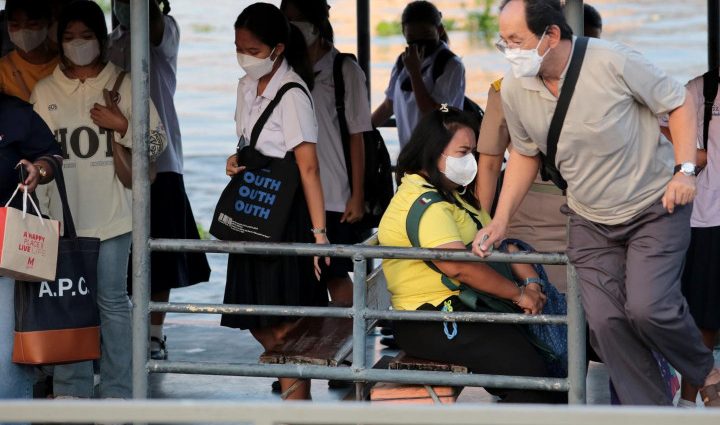City Hall considers remote work plan

City Hall is closely monitoring ultra-fine dust pollution levels and will implement a work-from-home programme if seriously unsafe levels are predicted for three consecutive days, Bangkok governor Chadchart Sittipunt has said.
Mr Chadchart said on Monday an alert would be sent via City Hall’s network, which has more than 50,000 members, following a forecast that the capital will encounter poor air quality from Thursday to Saturday.
Bangkok residents in 17 districts have also been warned to brace themselves for orange-coded or harmful pollution levels today. The districts are Laksi, Chatuchak, Klong Toey, Phra Khanong, Bang Na, Phaya Thai, Din Daeng, Huay Kwang, Klong Sam Wa, Min Buri, Saphan Sung, Taling Chan, Bangkok Noi, Thawi Watthana, Bang Kae, Nong Khaem and Bang Bon.
According to Thailand’s Geo-Informatics and Space Technology Development Agency (Gistda), ultra-fine dust particles in Bangkok ranged between 31.1–58.3 µg/m³ on Monday, compared with the safe threshold of 37.5µg/m³ set by the government. Samut Songkhram had seriously harmful, red-coded pollution levels at 108 µg/m³, followed by Samut Sakhon at 101.2 µg/m³, Ratchaburi at 87.2 µg/m³ and Phetchaburi at 77.6 µg/m³. Twenty-two provinces also reported unsafe, orange-coded levels of ultra-fine dust.
Mr Chadchart said that higher dust levels are believed to be caused by poor air conditions and hotpots in the central region, with 1,089 hotpots recorded during Jan 1-9 this year, a 107% increase from the same period last year. The governor said City Hall’s campaign urging motorists to switch to a higher-quality diesel that meets the Euro 5 environmental emission standard is expected to take some time before it goes into full swing.
He added that City Hall has eight clinics where people can seek medical attention if they have respiratory symptoms, or they can access telemedicine service via the “Mor Kor Thor Mor” (BMA’s doctor) application.
Dr Atthapol Kaewsamrit, deputy director-general of the Health Department, urged parents to be attentive to their children’s health when unsafe levels of pollutants are predicted because their immune system is not fully developed.
He said children must wear face masks outside and should receive medical attention when they experience breathing difficulties.
Meanwhile, the Pollution Control Department (PCD) reported on Monday that more than 9,000 complaints regarding environmental issues were submitted to the department last year.
A majority of them were not associated with the department’s authority, said Preeyaporn Suwanakate, the department’s director-general. She said the department had suggested they contact their local authorities to deal with their problems.
She said 40% of the complaints involved pollution smells, 26% dust particles, and 15% loud noise.

